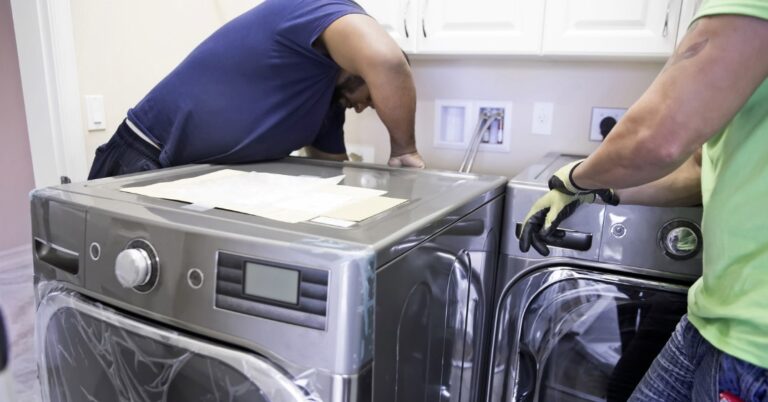Why Is My Smoke Alarm Beeping How To Stop The Chirping
Your home’s smoke alarm could save your life by detecting fires early. Home fires can start in many ways and in any room. No matter where or how, a smoke alarm is the first step to family safety.
How do I ensure my smoke alarm is functioning properly?
Persistent and mysterious smoke alarm beeping can be very irritating. But it’s essential to keep using smoke detectors.
The following tips will keep your smoke alarms working:
- Check units monthly.
- Install fresh batteries promptly or annually when the low-battery alarm sounds.
- Vacuum smoke alarms periodically with a brush.
Don’t uninstall your smoke alarm if it’s beeping randomly. Instead, identify the issue, get professional aid, or replace it. It is protecting lives and property from fire dangers.
Why is my smoke alarm beeping?
Beeping smoke detectors might be annoying. Usually, a chirp every 30 to 60 seconds means the battery is low; replacing it should fix it. However, sometimes changing the battery doesn’t stop the beeping, or the alarm goes off without reason. If you have several detectors and only one is beeping, the problem is limited to that unit. On the other hand, if all of your detectors sound simultaneously, it may indicate a more significant electrical issue unrelated to the individual units.
Why is my smoke alarm randomly beeping?
If the smoke alarm emits a recurring alarm, it indicates that the battery is experiencing low power and requires immediate replacement. It is strongly recommended to regularly inspect and replace the batteries in your smoke alarms, ideally at a frequency of at least biannually.
Why Fire alarm beeps randomly at night?
Common reasons for beeping smoke alarm are:
- The battery replacement must still be done with the correct type and orientation.
- Low temperatures at night can affect the battery’s performance, leading to nighttime beeping.
- Look for potential issues related to the alarm’s age by checking its manufacture date.
What are the common reasons for smoke detectors beeping?
There are many reasons behind a smoke detector chirping Sound:
- The smoke detector battery may need to be fixed or properly placed.
- The smoke detector sensing chamber may be filthy.
- Humidity and heat can cause false alarms.
- Sometimes a new smoke detector’s pull-tab remains.
- The battery drawer may be open.
- An electrical problem could turn off the smoke detector.
- The outdated smoke detector needs replacement.
How to stop smoke alarm from chirping without battery?
If your hardwired smoke alarm is ringing, it can be perplexing. Because these alarms frequently feature a backup battery that can become active and signify an issue, they can sound even without a charge.
Why is Smoke alarm beeping with new battery?
If you replace the battery in your smoke alarm and it continues to sound off, take the alarm apart and hold down the test button for 15 seconds. This will remove any charge that may be left in the alarm. Then, replace the battery. Cleaning the alarm may help if the beeping continues. These procedures should fix the beeping.
First alert smoke alarm beeping. Why?
Finally, your smoke detector may beep for several reasons. Low batteries can indicate replacement. Another possibility is that the alarm batteries were misinserted. Checking and fixing these issues often stops the beeping.
Why is my Hardwired smoke detector chirping?
Many hardwired smoke detectors incorporate a 9-volt battery backup for power outages. The detector chirps when the battery is low. Changing the battery generally fixes this. Dust can build up on ceiling and wall smoke detectors, so regular cleaning is necessary to keep them working.
How do I stop my smoke alarm from beeping?
Steps to silence your smoke alarm:
- Check your home for smoke or fire.
- All smoke alarms should be checked if one is beeping close.
- Low batteries cause most alerts. Changing the smoke alarm battery requires opening the cover. Choose a suitable battery and follow the instructions.
- Some smoke alarms have a “Test/Silence” Button button. Press this button if battery replacement doesn’t cease beeping.
- Sensor chamber dust might create false alerts. Clean the alarm with air or a soft brush.
- Smoke alarms might trigger each other. All alarm batteries should work.
- Sometimes changing the battery requires resetting the alarm. Refer to the user manual for model-specific reset instructions.
If the smoke alarm remains blaring after following the preceding steps, it may be broken or expired. Let’s replace everything.
Can you silence a smoke detector from beeping?
- You can take steps to stop your smoke alarm from beeping or chirping:
- Press the front “Test/Silence” button.
- If that fails, spin the gadget counterclockwise to remove it from the base.
- Open the back battery compartment after removal.
- Try removing and replacing the battery to fix it.
These methods should fix your smoke alarm beeping.
What do multiple beeps in a smoke detector mean?
Multiple smoke alarm alarms can indicate several issues. A smoke-CO detector may be a carbon monoxide alarm. It could also indicate a broken or expired gadget. Location of the detector might affect temperature and humidity and cause irregular beeping. Extreme temperatures can hinder its function if it’s near HVAC units, open windows, or ceiling fans. Electrical current variations may cause hard-wired smoke alarms to sound.
Why is Smoke alarm beeping every 10 minutes?
Your smoke alarm may beep every 10 minutes for numerous reasons:
- Low Battery: Low batteries beep most often. Check and replace low alarm batteries.
- Misfunction: Smoke alarms may beep often. Replace the alarm if battery replacement fails.
- Dust: Chamber dust can create false smoke alarms. Cleaning the alarm may help.
- End of Life: 7-10 years for smoke alarms. An aging alarm may need to be replaced.
- Interconnected Smoke Alarms: Beeping alarms can activate others. All alarm batteries should work.
The user handbook or manufacturer’s customer service can help if the beeping continues.
What does it mean when smoke alarm beeps every 30 seconds?
A low battery causes your smoke alarm to beep every 30 seconds or minute. Incorrect battery placement or a partially open battery drawer may cause it. Smoke detectors may chirp due to dirty sensors or expiration.
To stop beeping in contemporary smoke detectors, replace the batteries. That won’t work? Check for dust or dirt blocking the sensors. Consider replacing the unit with a trustworthy smoke alarm if the problem persists.
How to stop smoke detector chirping Sound?
Smoke detector alarms usually indicate battery replacement. Before acting, determine if your smoke detector is battery-powered or hard-wired. Check for wires after removing it from the ceiling. Check for several interconnected smoke alarms in your home.
Why my smoke alarm keeps beeping?
When your smoke alarm keeps beeping, it usually means the batteries are low, even if there’s no smoke. To fix it, just change the batteries and reset the alarm. This helps keep it working right.
The beeping is a good thing because it tells you when to change the batteries. Sometimes, the beeping happens for other reasons. Check inside for a forgotten ‘pull tab’ or dust or bugs. After clearing these, make sure the battery compartment is closed correctly.
How do I stop my smoke alarm chirping?
If your smoke alarm goes off or keeps beeping, make sure there’s no smoke in your home. Stop the unpleasant beeping after you’re convinced it’s a false alert. So how:
- Find the chirping smoke detector.
- Create a safe step ladder for easy access.
- Press the detector’s front “Test/Silence” button to cease beeping.
How to reset a smoke alarm?
Even after changing the batteries, your smoke alarm may keep beeping. Reset it to fix this. How varies depends on your alarm’s make and model. Follow these steps for the most common smoke alarms without a user manual. Keep in mind that alarms may signal a fire. Investigate before reset.
- Press and hold the reset button on battery-powered alarms until the beeping stops.
- Try the reset button for mains-powered alarms. If it fails, turn off and on your circuit breaker to mute the alert.
- Remove the batteries to mute the alert while getting professional aid. Remember to restore it quickly to keep your building’s fire warning system functional.
Where should I install a smoke detector in my home?
Smoke alarms, especially photoelectric ones, can be sensitive to various factors. False alarms are likely near stoves, sinks, showers, drafty windows, furnaces, and other places with smoke, steam, or vapors. Proper placement is crucial to avoid these false alarms or random beeping.
How to replace a smoke alarm battery?
Check and replace the batteries every six months if your smoke detector keeps beeping. Make sure batteries are the same voltage. Newer electric detectors may keep chirping after a battery change due to faults. These issues can be fixed by resetting the smoke alarm.
Make sure new batteries are fresh and charged. Avoid storing batteries in the cold for power loss. This avoids the frustration of changing batteries and hearing the chirping again.
Do smoke detectors last for a long time?
The average lifespan of smoke detectors is approximately ten years, although this duration may differ based on the specific brand and the level of maintenance performed. If the elapsed time since the manufacturing date is 10 years (excluding the purchase date), it is advisable to consider replacing the existing ones.
You can replace your smoke alarms earlier, but there’s no strict rule. Some people swap them every two years, while others wait the full ten.
Remember to test your smoke detectors every month. If they don’t sound during a test, try changing the batteries. If that doesn’t work, replacing the detectors immediately is crucial.
Over time, alarms can wear out or accumulate dust and debris, leading to malfunctions. If your smoke alarms act up before they’re ten years old, it’s better to replace the entire unit to ensure your family’s safety.
What are Hardwired smoke alarms?
Hard-wired smoke detectors are connected to your home’s electrical system and usually come in sets for complete coverage. They eliminate room-specific battery-operated equipment.
Hard-wired alarms don’t need battery testing or replacement, a key benefit. They cost more since they require professional installation. Some hard-wired variants have battery backups for power outages, adding security.
What are Battery Operated smoke alarms?
Battery-operated smoke alarms work separately so that one won’t trigger the others. They are a simple and economical home safety option if you can’t install hard-wired detectors. They work during power outages because of batteries. These alarms need regular testing and battery replacement.
How do I know my smoke detector is faulty or outdated?
If your smoke alarm keeps buzzing despite a good battery, it may malfunction or die. Due to their ionization materials, many smoke alarms last 7–10 years.
For safety, replace them after this age because they may also not detect fires. The smoke alarm’s expiration date is typically beneficial.
What is the best way to choose FOOTHILL FIRE PROTECTION for my fire alarm needs?
Combine hard-wired smoke detectors with a Foothill Fire Protection fire alarm system for advanced fire and emergency protection in Northern California. Our fire alarm installations, repairs, replacements, and 24/7 monitoring protect your property.
Foothill Fire Protection prioritizes integrity, relationships, safety, and excellence in delivering exceptional fire protection services. Our experience includes fire sprinkler, suppression, and extinguisher systems adapted to your needs, built swiftly and within budget.
More Posts Related to Smoke Detectors:
- Smoke Detector Blinking Green
- Smoke Detector Blinking Red
How to troubleshoot a beeping smoke detector?
Smoke alarm troubleshooting tips:
- Perform the task of replacing the batteries in the smoke alarm.
- Ensure that the fire alarm battery drawer is tightly closed.
- Disengage the smoke alarm battery pull tab, if present.
- Perform maintenance on the fire alarm’s soiled sensing chamber.
- Conduct periodic monitoring of temperature fluctuations in smoke alarms.
- It is recommended to consider acquiring more recent smoke detectors if issues continue.





